'Our democracy is deeply imperiled': how democratic norms are under threat ahead of the US election
Last month Barack Obama returned to the political stage to deliver a speech about the future of the nation. He did it standing in the Museum of the American Revolution in Philadelphia against the backdrop of a facsimile of the US constitution, which was drafted and signed in that city.
This was not the Obama of old, jacket off, sleeves rolled up, firing rhetorical retorts about hope and change that the world came to know on the campaign trail in 2008. This was a more restrained, somber Obama who barely raised his voice and looked sternly into the camera.
Related: Khizr Khan: 'Trump may damage American democracy permanently'
He talked about how the president of the United States should be “the custodian of this democracy”, and how he had hoped Donald Trump would “discover some reverence for the democracy that had been placed in his care, but he never did”.
He went on to warn that democratic institutions in America were “threatened like never before”. Addressing weary voters tempted not to bother in November’s presidential poll, he told them that Trump and those “who enable him” were “counting on your cynicism … they’re hoping to make it as hard as possible for you to vote, and to convince you that your vote doesn’t matter”.
Then he delivered a coup de grâce: “That’s how a democracy withers, until it’s no democracy at all.”
Barack Obama would say that, wouldn’t he? His speech was a keynote at the Democratic national convention, delivered in support of his friend and former vice-president, Joe Biden.
But you don’t have to listen to Obama to hear alarm bells ringing over the health of American democracy. Set the party politicians and their partisan screeds to one side, and you can still pick up ominous forebodings that grow louder by the day.
Leading figures in the non-partisan world of democracy reform and civil rights are articulating exactly the same concern. Is the backbone of American democracy strong enough to resist the triple blast of pandemic, the Black Lives Matter reckoning with police brutality and racial injustice, and an incumbent president hellbent on holding on to power whatever the cost?
“This is a perfect storm in this country,” said Vanita Gupta, who heads the nation’s oldest and largest civil rights coalition. “We can’t take American democracy for granted, as for a long time we did.”
Then Gupta, president and CEO of the Leadership Conference on Civil and Human Rights, used a word not usually associated with America. “Things are happening on our watch that are clear signs of authoritarianism,” she said, “and we have to push back.”
•••
School kids around the world are taught that the United States is the world’s oldest constitutional democracy. It may not have been perfect – how could it have been when enslaved people were excluded and women only got the vote 100 years ago last month? – but it was there, bolstered by its legendary checks and balances, standing proud both as a clarion call to government by “We the people” and as an admonition to petty dictators everywhere.
We can’t take American democracy for granted
Vanita Gupta
But with 55 days to go before election day, the sense is building that this cycle has veered way beyond the normal imperfections and incompetency of US elections. Deep cracks are being prised open in the core institutions and structures of democracy itself that raise the question: is the edifice revered for more than 200 years quite as solid and robust as assumed?
The Guardian spoke to the principals of five major US organizations that are at the heart of the movement to protect and improve US democracy and civil rights. Though each came from distinct starting points – from racial justice to electoral reform and the fight against economic inequality – they have all arrived at the same disturbing end point: profound anxiety about the state of the nation.
“Our democracy is deeply imperiled,” said Michael Waldman, president of the Brennan Center for Justice, the go-to authority on all things electoral. “We have relied on democratic norms and expectations for years that now turn out to be very weak in the face of somebody with an authoritarian bent.”
That word “authoritarian” again.
“A set of actors in the Trump administration and the Republican party have made it very clear that their intention is to hold on to political power at the expense of democratic institutions,” said Sabeel Rahman, president of the thinktank Demos.
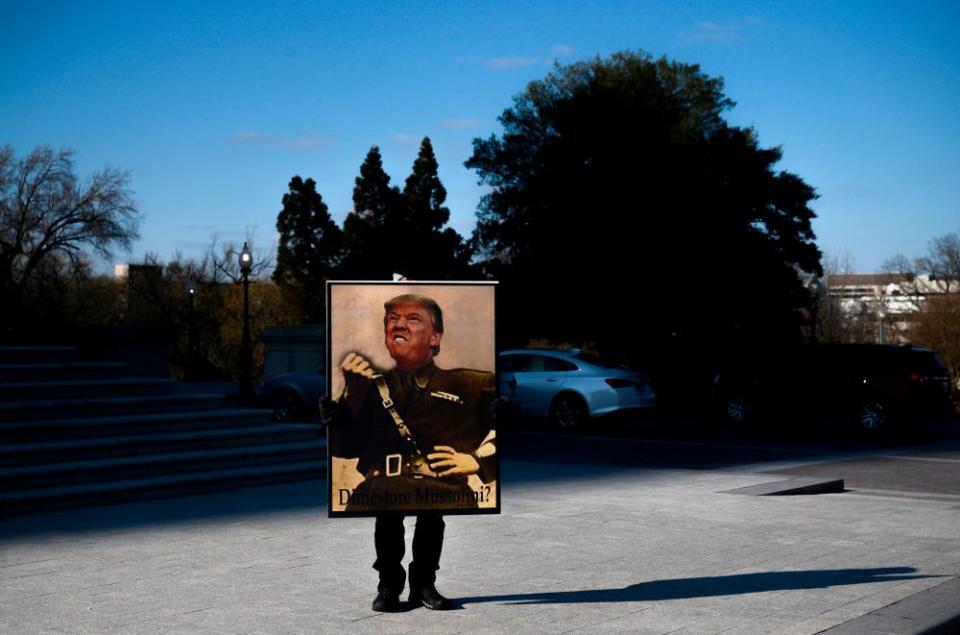
Take two of the central pillars of American representative government: the twin concepts that there will be a presidential election every four years and that there will always be a peaceful transfer of power from one president and party to the next. Trump has already trashed both.
In July, the US president used Covid-19 as an excuse to float the idea of postponing the election – something that none of his predecessors ever did no matter how severe their respective crises: not during the civil war, not in the thick of the 1918 Spanish flu pandemic, not in the second world war. In this case, Trump’s intervention was startling but ultimately powerless – he has no more ability to delay the election than to convert the White House into a Trump hotel.
But when it comes to the peaceful transfer of power, his capacity for troublemaking on 4 November, the day after the election, is considerable. Trump was asked by the Fox anchor Chris Wallace whether he would honor the timeworn principle that the loser concedes, and replied: “No, I have to see. I’m not going to just say yes, I’m not going to say no.”
That was no idle threat. Given the vagaries of the pandemic, there is likely to be a surge in ballots cast by mail that could take days to count, giving Trump potentially weeks before a final result is known to create havoc.
The Republican party has amassed a $20m war chest to spend on litigation in what has the potential to be a toxic post-election period. Trump has also commandeered the support of the US attorney general, William Barr.
In normal times, the justice department (DoJ) which Barr leads would be looked to as one of the hallowed checks and balances safeguarding democracy. But as was seen during the Mueller inquiry into Russian links with the Trump campaign during the 2016 presidential race, Barr has shown himself willing to cross the line in defending the president above the constitution.
Testifying before Congress this summer Barr pointedly declined to give assurances that he will keep the DoJ out of any contested election count in November.
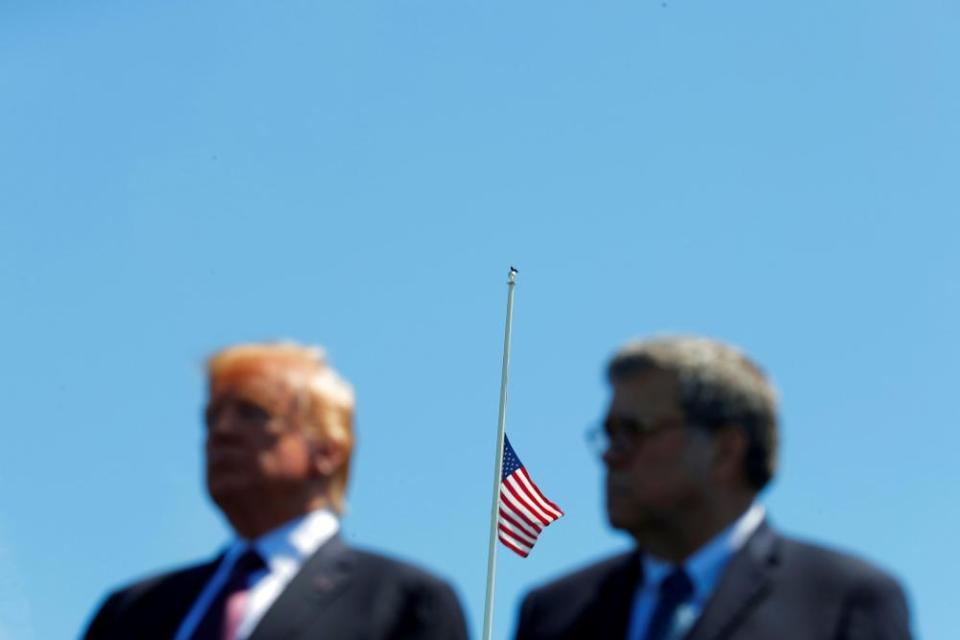
“It sounds outlandish to say that in an American election one party would refuse to admit the legitimacy of the result, but that’s very much where we are and all the rhetoric right now is about creating the atmospherics that would enable that kind of power grab on 4 November,” Rahman said.
In Waldman’s view, pondering whether Trump will accept the result of the election is asking the wrong question. “We are falling into his royalist mindset if we think that matters. What matters is whether the rest of us accept the results.”
But Trump has that down too. Over the past several months he has relentlessly sought to undermine the credibility of the presidential poll, calling it the “greatest rigged election in history”.
Trump claims that US elections are riddled by fraud which allows Democrats to steal victory. The accusation has become a favorite of Republicans in recent years, despite having been conclusively debunked.
As Waldman, an authority on the subject, put it: “In the US in 2020, widespread claims of voter fraud are not a charge, they are a lie. Voter fraud is vanishing rare, as every study has shown over and over again.”
Trump, with Barr’s avid backing, has reserved his bitterest scorn for voting by mail, a form of democratic participation that has been used routinely by one in four Americans – of all political persuasions – entirely uneventfully. Until this year there was no significant public anxiety about this most anodyne of practices, yet look at what the polls say now.
A recent Opinium Research poll for the Guardian found almost three out of four Trump voters are worried about fraud in mail-in voting. More telling still is that more than a third of those who intend to vote for Biden share those misgivings.
Donald Trump is not trying to win the election, he’s trying to hold on to power.
Deirdre Schifeling
Trump’s precise intentions in whipping up this storm are uncertain, but whatever the motivation his efforts are working. As we enter the final stretch of the election, almost half of Americans are wavering over the very bedrock of US democracy – confidence that the ballot will be fair.
“Distrust is being stoked and weaponized,” Rahman said, “and a huge chunk of the country has been primed to disbelieve the legitimacy of the result – whatever that result is.”
Deirdre Schifeling expressed the same thought differently: “Donald Trump is not trying to win the election, he’s trying to hold on to power.”
•••
Schifeling is founder and campaign director of Democracy For All 2021, a progressive coalition seeking reform of the US system. A few years ago she came to the realization that there was a growing disconnect between the will of the American people and their political representation in federal and state governments.
“I was talking to my colleagues in a range of organizations and we were sharing our frustration at not being able to make progress on our missions,” she said.
They began to compare notes and found their experiences overlapped. In key areas such as access to healthcare, worker rights, combating the climate crisis and policing reform, “We the people” were on the side of progress by a clear majority.
At the time, Schifeling was head of the advocacy arm of Planned Parenthood, the country’s largest provider of reproductive health services. She could point to polls that suggested that in her field 70% of Americans approved of the US supreme court ruling Roe v Wade that legalizes abortion.
Yet Schifeling found herself spending more and more of her time defending Planned Parenthood against the aggressive attacks of a small minority of extremist anti-abortion politicians. Despite the settled nature of the law, and the clear progressive bent of public opinion, women were finding it increasingly difficult in practice to secure their reproductive rights.
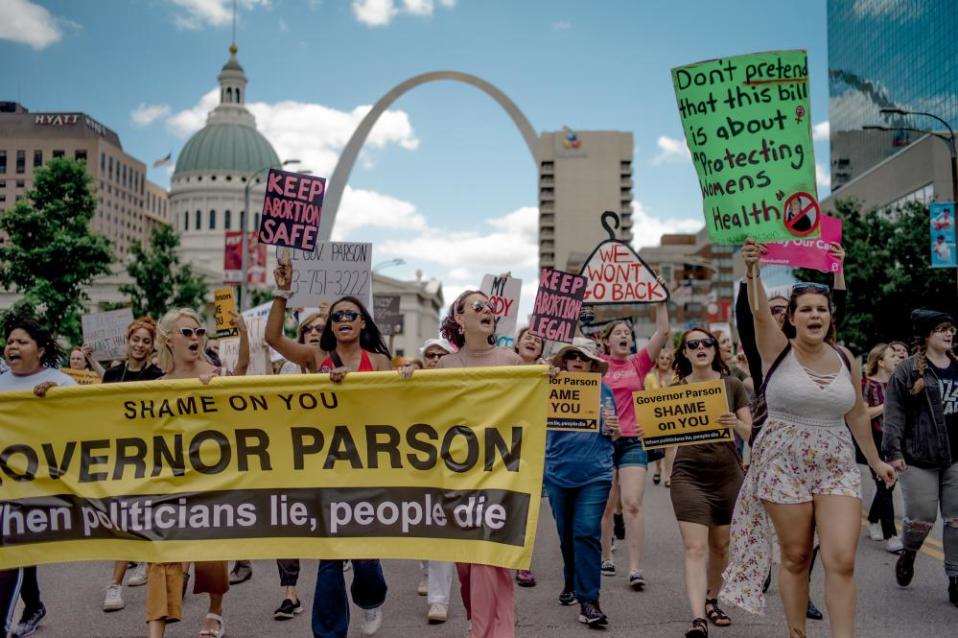
She reached a reluctant and unhappy conclusion: “Our government is not able to represent the will of the people.”
Since then, Schifeling and her peers have been looking at the causes of this dysfunction and searching for solutions. Some of it goes back to the founding of the nation.
The US Senate, with its rigid allocation of two senators a state, now skews heavily towards relatively unpopulated rural states that lean Republican over intensely populated Democratic-leaning urban centers. One voter in Montana (population 1 million) is worth 40 voters in California (population 40 million).
The electoral college too is capable of distorting outcomes, as has been seen twice in the past two decades. One of those occasions was Trump in 2016, an election which he won in the electoral college having lost to Hillary Clinton in the popular count by nearly 3m votes (the other time was George W Bush in 2000).
On top of those foundational irregularities, a slew of dirty tricks has been crafted over the years in the form of voter suppression. The practice is generations old, dating back to the days of southern segregation when African Americans were discouraged and intimidated from voting.
Derrick Johnson, president and CEO of the largest civil rights group in the country, the NAACP, noted that such sleight of hand used to be confined to the deep south but in recent years has metastasized nationwide. “What used to be a regional problem in the south has become a national critical issue. We’ve fought against it since our creation 111 years ago, but there’s been a huge uptick in efforts to misdirect, mislead or outright suppress the right of African Americans to cast a ballot in this election cycle.”
As Johnson indicated, skulduggery and US elections have gone hand in hand long before Trump came along. But in the run-up to this election, voter suppression techniques are being taken to the next level.
“We have not seen this level of intentional overt exclusion since the 50s and 60s,” Johnson said.
Time-tested voter suppression techniques are colliding with the pandemic to cause severe impediments to voting. Hours-long lines in polling places were seen in Georgia’s primary in June after many who requested mail-in ballots failed to receive them.
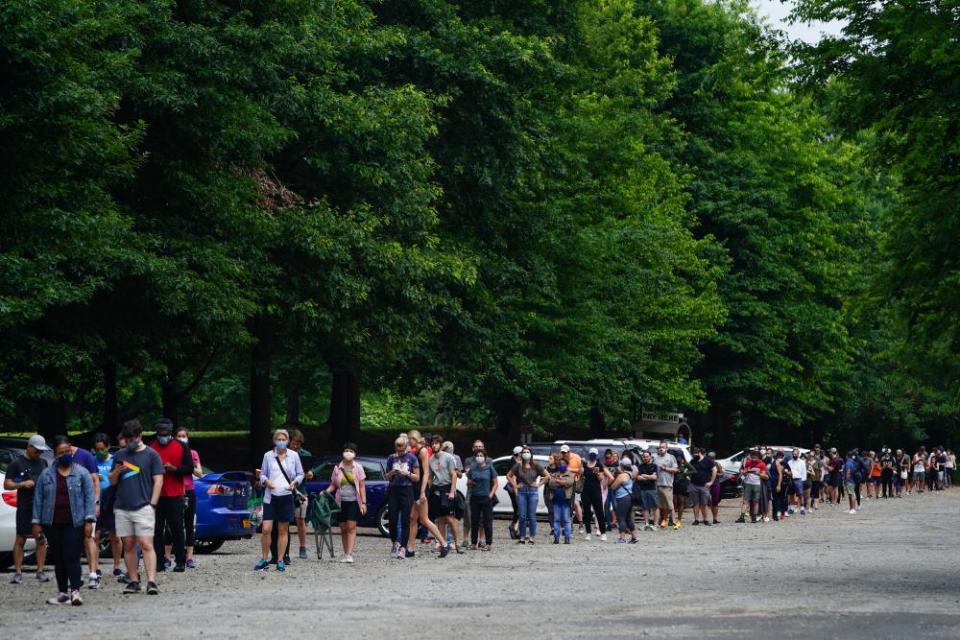
Milwaukee in Wisconsin, which has an almost 40% Black population, also suffered huge lines in April after polling places were reduced from 180 to just five. A Demos study found that average voter turnout in Black and Latino wards of Milwaukee in that primary was 30 percentage points lower than in majority white wards.
Other sub-species of voter suppression abound. In Florida, voters decided in 2018 to re-enfranchise 1.4 million people who had been stripped for life of the right to vote because they had felony convictions, only to have Republicans gut the reform by erecting insurmountable barriers that effectively overturned the will of Florida’s people.
The result is that more than 700,000 citizens, disproportionately Black and Latino, are likely to be denied the vote in November in a state that memorably handed Bush the US presidency in 2000 by just 537 votes.
The most glaring – and surreal – case of apparent voter suppression in the 2020 cycle relates to the US post office. Under the new US postmaster general, a major Republican donor named Louis DeJoy, steps have been taken that will hobble voting by mail including the removal of post boxes from streets and mothballing of sorting machines in post facilities.
DeJoy said he had suspended the cuts until after the election, but the damage may already have been done.
A US president appoints a big-money donor to destroy the post office as a ruse to prevent Americans voting. That sounds like one of those conspiracy theories so beloved of Trump.
But you only have to take the word of one person to know there is a problem here: Trump himself. He has openly admitted to withholding funding from the post office as a way of hampering voting by mail.
He has also been explicit about his reason for opposing mail-in voting, saying it would lead to “levels of voting that if you’d ever agreed to it, you’d never have a Republican elected in this country again”.
That comment spoke volumes. It gives an extremely rare insight into the political course adopted by Republican leaders in recent years.
“It tells us that those in power simply don’t want a true representative democracy, that too many people voting in their estimation creates a hurdle,” Johnson said. “Instead of seeking ways to be more inclusive in their public policy, they exclude people from participating as citizens.”
Johnson was alluding to the shifting demographics of the US. When Ronald Reagan was re-elected in 1984, 87% of registered voters were white. By this November that proportion is projected to have fallen to 67%. And by 2045, the US is expected have become a minority-white nation – meaning that less than half of the voting public will be white.
“The electorate is becoming more diverse, and one group is trying to hold on to power by making it harder for Black, Latino and other minorities to vote,” Waldman said.
For many Americans, democracy has been a fiction and we are having to come to terms with that
Sabeel Rahman
The consequences of this epic demographic shift, and the political response to it, helps explain the extraordinary outpouring of protests that erupted this summer across America. The Black Lives Matter demonstrations were triggered by police brutality following the killing of George Floyd, but in a wider sense they were a howl of anger about the failures of American democracy.
“The protests put a spotlight on the fact that for Black and brown Americans, they are already not living in a democracy,” Rahman said. “For many Americans, democracy has been a fiction and we are having to come to terms with that.”
The Republican party’s way of coping with the demographic shift – standing by its shrinking base of white voters while imposing increasingly extreme voter suppression on everybody else – is only likely to exacerbate that problem. As Waldman put it: “One of the two main parties in the United States has embraced a vision of white nationalism and is changing the rules of democracy so that others can’t vote. The ferocity of the voter suppression, the intensity of the undermining of democratic norms, this is not improvisation – it’s a core strategy.”
•••
Donald Trump is a master of imagery and soundbites, a skill honed during his apprenticeship in reality TV. That finesse was on full display during his speech to the Republican national convention last month where he appeared flanked by 50 American flags.
Stunts like that raise the question, does any of this matter? Are these visual spectacles merely the actions of a man who craves attention, full of sound and fury signifying nothing?
Yes, but it doesn’t stop with the imagery and soundbites. His RNC stunt was staged from the White House grounds – a shattering of unwritten democratic norms that until now have prohibited the use of the White House for political rallies.
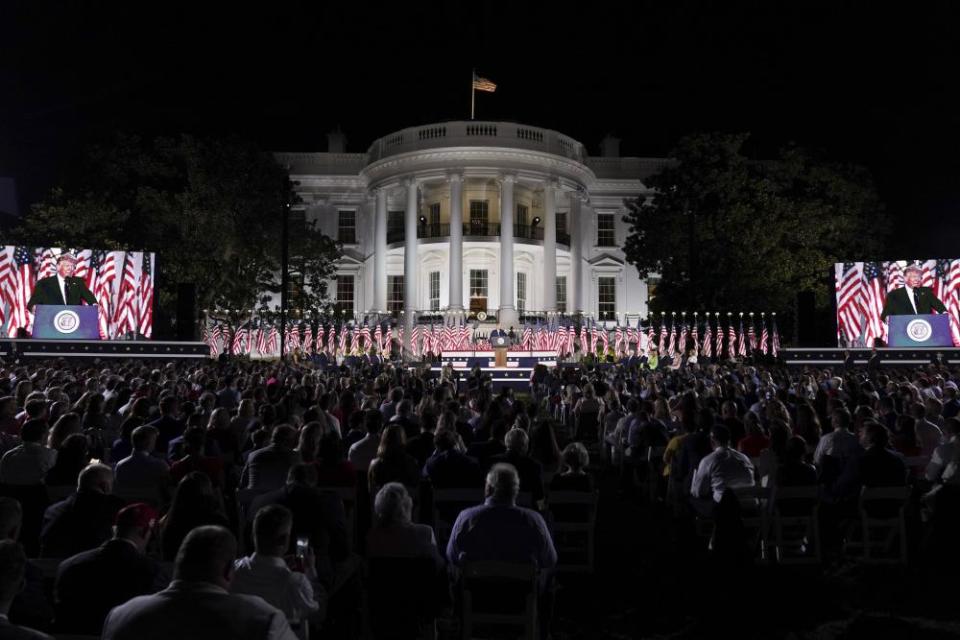
When Trump stood outside St John’s church near the White House in June it wasn’t a mere photo op. He had mobilized federal agents in riot gear unleashing teargas on peaceful protesters to clear a path.
“What happened in Washington DC was unconscionable,” said Gupta. “It was an abuse of power.”
Once again Barr, the US’s top law enforcement official, was an accessory to the fact. The whittling down of checks and balances goes wider than the justice department, it reaches the heart of the judiciary: judges.
Trump has so far appointed more than 200 federal judges including two US supreme court justices – lifetime appointments every one. That will yank the judiciary in a hyper-conservative direction that in turn will distort the democratic system for years to come.
As the final push to election day gets under way, Trump has set in train his most contentious campaign strategy yet – what Johnson of the NAACP calls his “fear narrative”. Having invoked the specter of “American carnage” in his inaugural address back in 2017, the president is now busily stoking up trouble in cities across the country so that he can then present himself as the “law-and-order” candidate who will take the anarchists on.
Cohorts of vigilantes have descended on largely peaceful Black Lives Matter protests with Trump’s endorsement of them as “patriots” egging them on. He has gone so far as to defend the teenaged gunman charged with murdering two people in Kenosha, Wisconsin. “This president can only win by stoking fear,” Johnson said.
It all amounts to a cumulative chipping away at the load-bearing structures of American democracy that has left our five panelists greatly unnerved. “I would be lying if I didn’t say that I am still shocked, that every few days I wake up and say this can’t possibly be happening,” Waldman said.
Shocked, yes. Despairing, no.
“I am a civil rights advocate, I have a profound well of hope that keeps me in this work,” Gupta said. “Despair is a feeling of the privileged.”
Schifeling is convinced this election marks a tipping point in America, a moment in which the country, having been jolted out of its complacency, will rebound. “Faith in our democracy is at an all-time low and that is very dangerous. Now the work begins on fixing it.”

